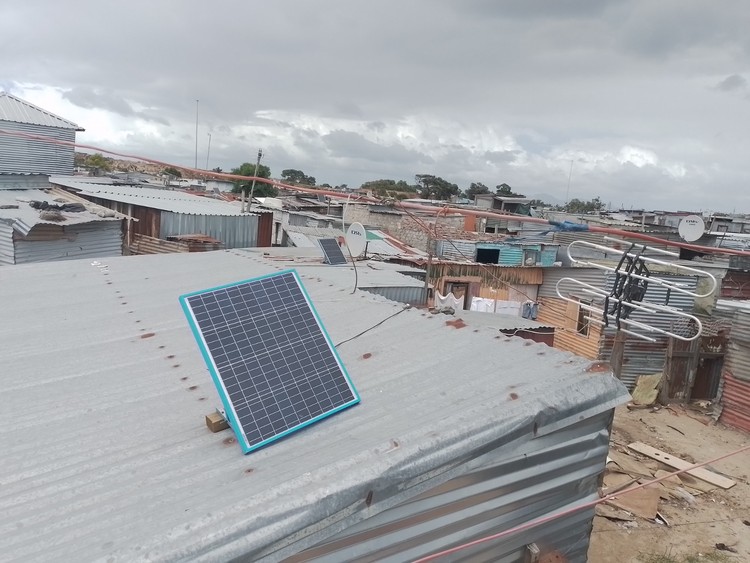Shack dwellers hope for subsidised solar power
The City of Cape Town is considering partnering with alternative energy providers for informal settlements
A solar panel installed by the iShack Project at Siqalo informal settlement near Mitchells Plain. Photo: Sandiso Phaliso
- About 200 shacks in Siqalo informal settlement in Cape Town have solar panels supplied by the iShack project.
- These can power lights, a television and charge cellphones.
- But residents that struggle to make the monthly payments for the installation are hoping the City will contribute.
- The City says it is looking into partnering with alternative energy providers, such as iShack, for informal settlements where grid-connected electrification is not possible.
It’s supper time at Siqalo informal settlement near Mitchells Plain and Nobubele Sizakhele fires up her paraffin stove. A single mother, she supports her two children by working odd jobs and doing domestic work.
Hers is one of about 200 shacks with a solar panel installed by the iShack Project, set up to develop a model for “free-basic”, off-grid solar electricity service for poor households that do not yet have formal grid access. Except Sizakhele can no longer afford the fees and she is currently disconnected.
Most of the shacks in the settlement of 2,000 families are connected illegally to electrical poles along Jakes Gerwel Drive. The land is mostly privately owned, limiting what services the City of Cape Town can provide.
The iShack Project operates in nine informal settlements across Cape Town. In a few cases, where grants or donations have been provided, it has been possible to reduce the fees. But most people have to pay the full cost, and for households without a consistent income, like Sizakhele’s, making those monthly payments is a challenge.
Sizakhele’s solar panel generates enough energy to power lights, a television and charge phones. Her home was lit with electricity through the solar panel last winter, but now iShack has switched off the solar panel as she has failed to pay for three months.
“Living without electricity is hell because we cannot buy electrical appliances. Even though we are in an urban area, it is no different from living in a village. Life here is tough and this is not a place to raise children,” said Sizakhele.
The iShack Project has found that only 10% of the shack dwellers are able to afford to pay for the panels.
Last week, the City of Cape Town announced that its Urban Energy Poverty Programme would look into alternative energy solutions, like the iShack Project, for informal settlements where grid-connected electrification is not possible.
Siqalo community leader Sakhumzi Kakaza, who also has a solar panel on his home, hopes the City will subsidise the iShack Project initiative.
“We used to experience shack fires but recently the number has dropped,” said Kakaza. “We are happy the City is interested in this initiative because it is going to change the lives of people for the better. We buy our own solar energy and would be happy should the City subsidise this initiative,” he said.
“Even though we can’t cook with solar power, it makes a huge difference,” he said.
iShack Project director Damian Conway said, “Without subsidy funding, the project is unable to cover its costs unless it charges fees for the service which start at R200 a month for a full Solar Home System. These fees are not indefinite and the project hands over ownership after three years, after which there are no more fixed fees.”
“We hope that the City will trail blaze a truly market-making policy that enables the poorest households to access the admittedly limited funds for free basic energy.”
Mayco Member for Energy Beverley van Reenen said the City was currently researching possibilities and investigating the implementation of free basic alternative energy for non-grid connected informal households, and piloting alternative public lighting solutions for unelectrified settlements.
Next: “Today is a waste of time” prosecutor in Thabo Bester case tells court
Previous: Increase tax on sugary drinks to fund an increase in social grants, say activists
© 2024 GroundUp. This article is licensed under a Creative Commons Attribution-NoDerivatives 4.0 International License.
You may republish this article, so long as you credit the authors and GroundUp, and do not change the text. Please include a link back to the original article.
We put an invisible pixel in the article so that we can count traffic to republishers. All analytics tools are solely on our servers. We do not give our logs to any third party. Logs are deleted after two weeks. We do not use any IP address identifying information except to count regional traffic. We are solely interested in counting hits, not tracking users. If you republish, please do not delete the invisible pixel.



